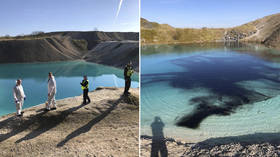Frank Furedi
is an author and social commentator is an emeritus professor of sociology at the University of Kent in Canterbury. Author of How Fear Works: The Culture of Fear in the 21st Century. Follow him on Twitter @Furedibyte
30 Mar, 2020 13:19

Was it really necessary for the Derbyshire police to dye a beautiful blue lagoon black to reduce its appeal during the coronavirus lockdown? Do they really need to use drones to spot dog walkers enjoying the fresh air?
There is something truly surreal about the Facebook post of the Buxton safer neighborhood police team regarding their act of vandalizing a ‘picturesque location.’ It states that the lagoon is a “dangerous” location since it might attract visitors. It adds that, “with this in mind, we have attended the location this morning and used water dye to make the water look less appealing.” One wonders how many other beauty spots will be disfigured by busy-body police officers?
This at a time when police resources are so close to being overstretched they are reportedly planning to scale back investigations and crime response.
It feels as if Covid-19 has infected the brain function of sections of the British Police. At a time of a national emergency, when all the public services are overloaded, sections of the police force somehow find that they have so much spare time that they can go out and hassle dog walkers. Yes, the nation faces a lockdown, but are people walking their dogs, taking in the fresh air really the coronavirus hotspot that needs the police’s immediate attention?
ALSO ON RT.COMCalling those who oppose totalitarian Covid-19 measures #COVIDIOTS is just another tactic by our sheepherders to shut down debate
Some are tempted to laugh off what appears as a few examples of overzealous policing in the countryside. Unfortunately, the tragic waste of police resources goes far beyond the excessive monitoring of the few people who venture out to watch birds in the countryside.
It seems that instead of fighting real crimes such as burglaries, violent assaults or muggings, sections of the police are devoted to the project of discovering crimes which no one has reported as such. In a tweet, the Metropolitan Police has asked the public to report COVID-19 related hate crimes. The tweet assures readers that “we do not tolerate hatred or abuse directed at communities because of their race, religion, disability, sexual orientation or gender identity.” After listing every possible variant of a hate crime, it promises a swift response from the police.
Are you a victim or witness of hate crime related to the COVID-19 pandemic?
We do not tolerate hatred or abuse directed at communities because of their race, religion, disability, sexual orientation or gender identity.
If you experience hate crime, please tell us & we will act.
5,965 people are talking about this
A video accompanying the tweet features an earnest looking policeman, who informs twitterland that the police are interested in your story even if you don’t think a crime has been committed! He says, “Even if you are not sure if it’s a crime you should report it. So we can investigate.” But investigate what? In this instance police time will be devoted to the investigation of just a report, not an actual crime.
There is something truly Orwellian about Metropolitan Police’s call for reports of incidents that may or may not be a crime. It represents an attempt to construct a problem where it does not really exist. When it comes to the quantification of hate crime, what matters is that something was reported, rather than if a crime was committed. According to existing procedures the police must record not only criminal acts but also non-crime hate events. A non-crime hate incident is simply any act that a person perceives as a form of behavior motivated by animosity towards a so-called protected characteristic. Since it is almost impossible to be certain about what motivated someone to communicate words that makes someone feel offended, just about anything can be reported and recorded as a non-crime hate incident.
ALSO ON RT.COMPanicked politicians who want to be seen to be acting are the real danger of the coronavirus outbreak
Even at the best of times, one would imagine that the police have more than enough real reported and unsolved crimes to investigate. It would be great if the same zealous desire to investigate was applied towards dealing with crimes like robberies or thefts from shops.
So why does the police devote resources towards hassling dog-walkers or recording non-crime incidents? If Sigmund Freud was asked this question, he would say it’s a classic case of a ‘displacement activity.’
According to Freudian psychology, a displacement activity works as an unconscious defence mechanism, whereby the mind substitutes a new aim for goals that are regarded as threatening or unacceptable. A cynic would observe that it is far easier to spot errant dog walkers than to catch a mugger. Recording reports of non-crime hate incidents is far less taxing than patrolling the streets of London.
Investing police resources in displacement activities is bad enough in normal times. During a national emergency, such misuse of resources is, for lack of better expression, positively criminal.
The statements, views and opinions expressed in this column are solely those of the author and do not necessarily represent those of RT.



0 Comments:
Post a Comment
Subscribe to Post Comments [Atom]
<< Home